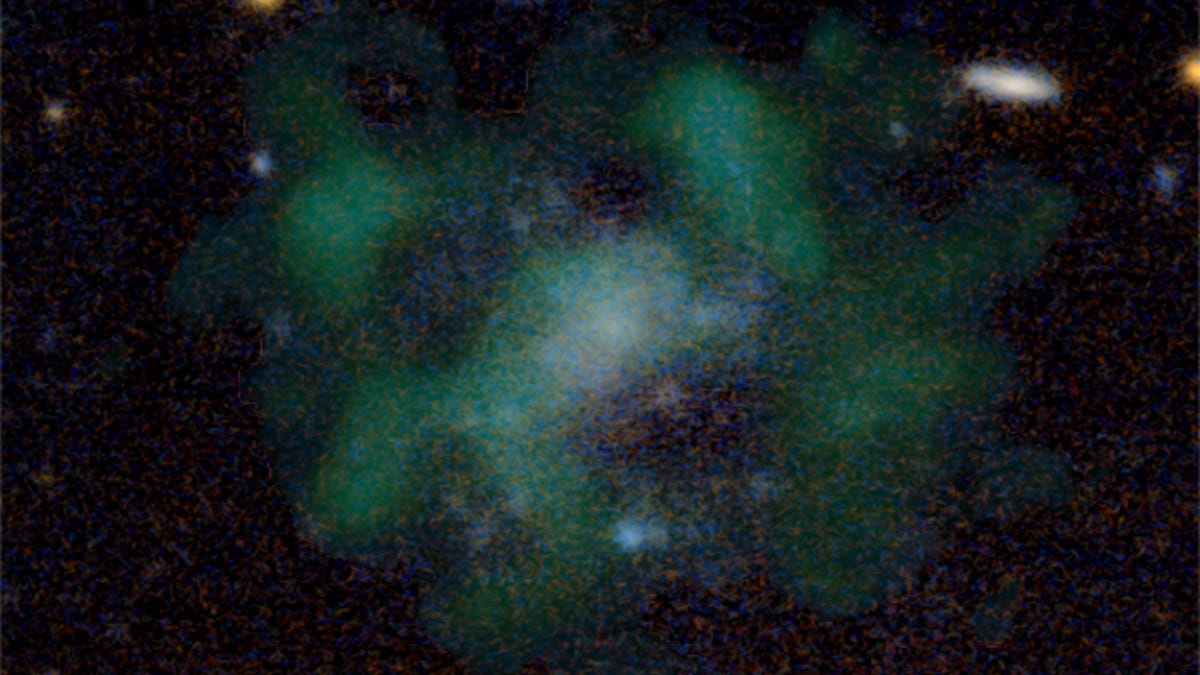Mysterious galaxy without dark matter puzzles astronomers
"The difference between theory and observation is only getting bigger."

The galaxy AGC 114905. The stellar emission of the galaxy appears in blue, and the green clouds show neutral hydrogen gas.
The universe is expanding extremely fast. Every second, stars are sailing away from each other, galaxies are entering new cosmic territory, and oddly enough, it's happening way too quickly. Even the most elegant calculations suggest there isn't sufficient matter in space to account for the speedy movement.
That's where dark matter comes in. What if there's an invisible force making the cosmos spread out? We can't see it and we don't quite know what it is. But what if we can feel it?
In the event that dark matter is real, experts think it could be ubiquitous. If the whole universe is expanding, then the thing causing that expansion should exist pretty much everywhere, right? Well, maybe not. Astronomers say they've located six galaxies that appear to have either very little or absolutely no dark matter. The team will present its findings in Monthly Notices of the Royal Astronomical Society.
Mentioning that they'd previously been told "measure again, you'll see there will be dark matter around your galaxy," the researchers zeroed in on one seemingly dark-matter-free region dubbed AGC 114905 to strengthen their evidence. Lurking 250 million light-years away from Earth, it's about the size of the Milky Way, with a thousand times fewer stars. So it's rather dim.
The researchers used a standard technique to detect the presence of dark matter in AGC 114905 that involves graphing the position and rotation speed of the galaxy's gas. After 40 hours of scrutiny with the high-powered Very Large Array Radio Telescope in New Mexico, they found the movements of the gas were perfectly explainable by normal matter alone.
"The problem remains that the theory predicts that there must be dark matter in AGC 114905," Pavel Mancera Piñabut of the Kapteyn Astronomical Institute at the University of Groningenour and an author of the study, said in a statement, referring to classic dark matter hypotheses. "Observations say there isn't -- in fact, the difference between theory and observation is only getting bigger."
Evidence for places without dark matter
Mancera Piñabut's team isn't the first to posit the notion of galaxies without dark matter. Actually, the specific galaxy class that AGC 114905 falls into, called an "ultra diffuse galaxy," already has a few members suspected to be at least somewhat devoid of the force.
Even more peculiar is that while all galaxies are thought to be held together by dark matter, ultra diffuse galaxies -- which have a low luminosity -- are particularly thought to contain the transparent phenomenon. It's a huge conundrum. The rich new evidence from Mancera Piñabut's team is yet another, especially strong, step forward in proving not every galaxy holds the elusive force, including ultra-diffuse ones.
One caveat, the team says, is that perhaps the angle at which they viewed AGC 114905 affected their observational results. "But that angle has to deviate very much from our estimate before there is room for dark matter again," Tom Oosterloo of Astron at the Netherlands Institute for Radio Astronomy and co-author of the study, said in a statement.
And if they're correct? The team offers up a few reasons for why AGC 114905 may not have any dark matter. For instance, what if super large galaxies nearby somehow stripped it of the force? As a rebuttal, though, Mancera Piñabut says there don't seem to be any such galaxies in the vicinity.
Further, he says, "in the most reputed galaxy formation framework, the so-called cold dark matter model, we would have to introduce extreme parameter values that are far beyond the usual range. Also with modified Newtonian dynamics, an alternative theory to cold dark matter, we cannot reproduce the motions of the gas within the galaxy."
All in all, dark matter might not be quite as potent as scientists once thought it would be.

